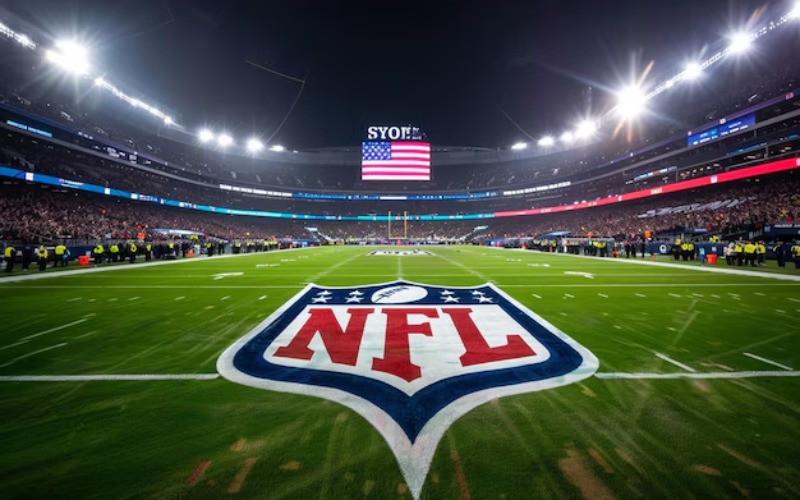The United States consumes an enormous amount of plastic daily. Across the nation, Americans create enough plastic waste to fill up the Dallas Cowboys NFL Stadium every 16 hours. Football stadiums, concert venues, and other entertainment locales are major contributors to the overflowing tide of plastic waste.
On average, a single NFL game produces 80,000 pounds of trash; throughout the season, the league accumulates approximately 44.6 million pounds of waste, equivalent to around 107 times the weight of every single NFL player in the league combined.
A significant plurality of this waste is composed of plastic. A single NFL game will use an average of 67,254 plastic cups. Additionally, any sports stadium can expect to use over 5.4 million cups over a year. Across all stadiums in the country, approximately 2,160,000,000 plastic cups are thrown out each year– that’s enough plastic cups to cover 4000 football fields or fill the Empire State Building over 85 times!
New Strategies to End Plastic Pollution
Stadiums and event organizers need to implement new strategies to end plastic pollution, and some have already been able to make progress. Super Bowl LVII, hosted in Phoenix, Arizona, in 2023, broke the record for the greenest Super Bowl in history with 92.6% of all trash diverted away from landfills, of which about 81%—or 163,820 pounds—were recyclables.
How was Phoenix able to achieve such remarkable success during the largest sports event of the year? Infrastructure, education, and volunteer support were significant components of the plan. New machinery that separates food packaging from food waste assisted in diversion rates to recycling and compost facilities, public messaging on proper disposal of trash helped educate the public, and a team of 51 volunteers signed up as Zero Waste Ambassadors to guide attendees through the process of separating waste. Staff and volunteers also worked together to sort through trash to ensure no recyclables would end up in a landfill.
While sustainability efforts such as those implemented at Super Bowl LVII are commendable and should be emulated in some aspects, the most direct zero-waste strategy is to eliminate the need for single-use items in the first place.
“From water bottles to cups and ketchup packets to straws, single-use plastic remains one of the biggest sources of waste at concerts and other large-scale events,” says Chris Spinato, manager of communications at REVERB. “Simple steps like providing water refill stations and allowing fans to bring reusable water bottles or policy changes like avoiding pouring drinks from cans to cups can help drive down waste. We’ve seen positive results on our tours when we’ve connected with venues in advance of a concert and worked together to drive down plastic waste,” says Spinato.
For single-use items that can’t be eliminated outright from stadium operations, officials must choose wise alternatives to plastic, as a rapidly growing body of research shows that recycling is not an effective solution to plastic pollution.
Stadium officials should be aware that many single-use alternatives labeled as compostable, including virtually all bioplastics, will only break down in commercial-grade, industrial compost facilities. Without carefully considered plans and business partnerships to properly collect and dispose of these items, commercially compostable service ware isn’t an effective solution.
Food service ware made from bamboo is often recommended as a rapidly renewable, biodegradable material with low carbon emissions required to manufacture. “As a fast-growing organic material with minimal climate pollution, bamboo is one of the preferred substitutes for single-use plastic,” says Aidan Charron, Director of End Plastic Initiatives at EarthDay.Org.
While aluminum is sometimes highlighted as another alternative, it’s not an ideal plastic substitute as a single-use item; a disposable aluminum cup consumes 46% more energy and 86% more carbon dioxide than its plastic counterpart.
As such, the best practice for drink service is reusable cups made from stainless steel or polypropylene. However, stadiums should be aware that these cups must be reused at least 6 times to be more sustainable than single-use plastic, and officials must be prepared with strong infrastructure to ensure their reuse.
Ultimately, venue owners and administrators are well-equipped to implement zero waste at their events given their control over distribution and disposal of items consumed by attendees.
Event organizers seeking sustainable improvements should begin with waste audits of their events to assess the amount and type of waste generated.
With this knowledge, a venue can choose to procure more sustainable service ware, create new waste management infrastructure to effectively respond to its needs, work with food/beverage/merchandise vendors to eliminate unnecessary plastics, and recruit volunteers or staff to strengthen the zero waste process from start to finish.
To learn more about plastic production, proliferation, and pollution, visit EarthDay.Org’s End Plastics Campaign and take action for a sustainable future.











